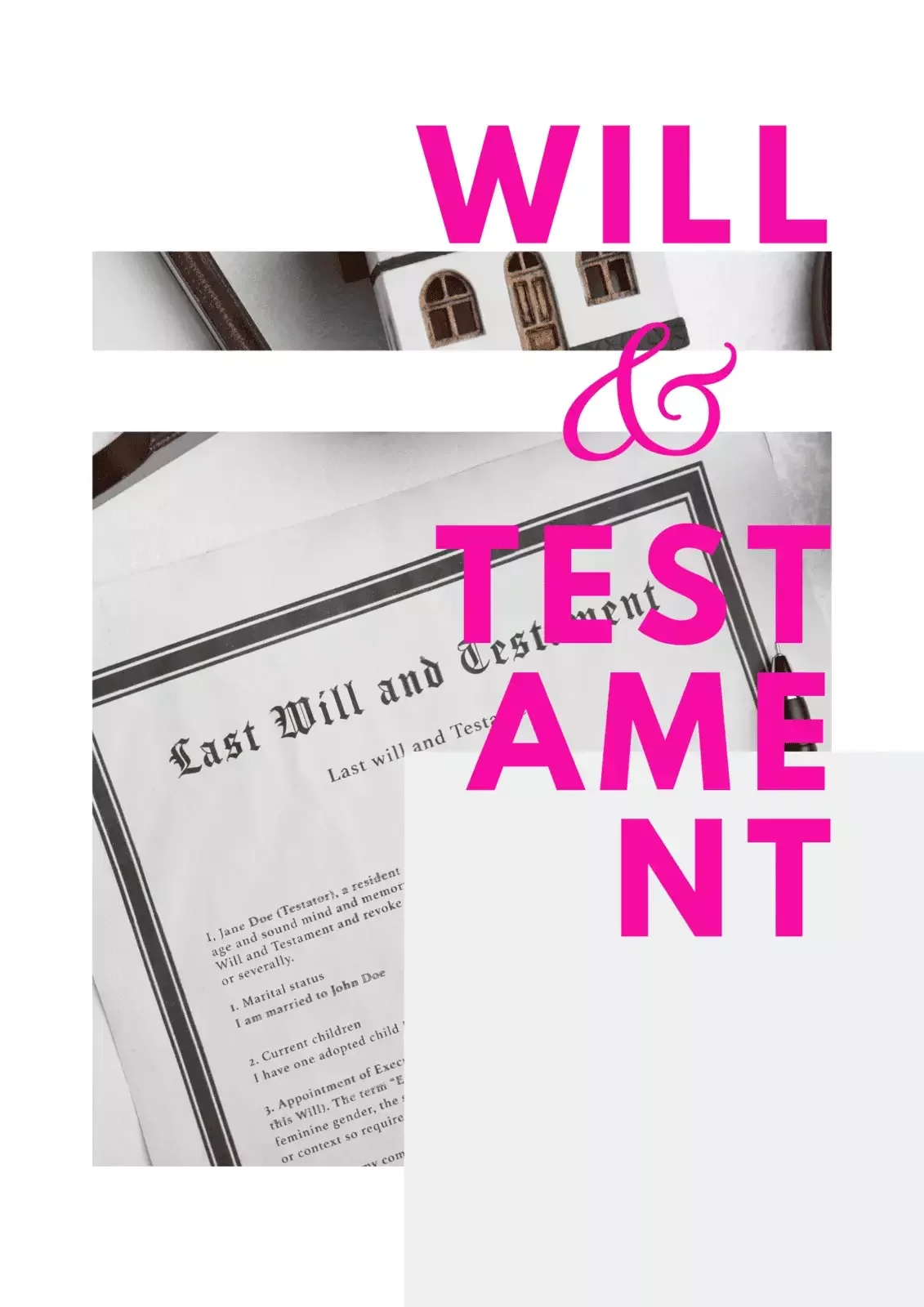
What is a Will?
A will, also known as a last will and testament, is a legal document outlining how you want your assets distributed after your death. It appoints an executor to manage your estate and ensures your wishes are carried out.
Historically, the terms "will" and "testament" were used interchangeably. However, modern usage reveals subtle distinctions. You can read more about it here:
Will:
1. Refers specifically to the distribution of property and assets after death.
2. Typically deals with material possessions, real estate, and financial assets.
3. Often focuses on the administrative aspects of estate management.
Testament:
1. Encompasses broader aspects, including personal wishes, values, and intentions.
2. May include non-material bequests, such as intellectual property, digital assets, or personal messages.
3. Can provide context and rationale for the distribution of assets.
Last Will and Testament:
Combines both aspects, addressing material and non-material concerns.
Provides a comprehensive outline of one's wishes and intentions.
Typically includes:
- Distribution of assets
- Appointment of executors and guardians
- Funeral instructions
- Personal messages or legacies
Key differences:
Scope: Will focuses on assets, while testament encompasses broader personal wishes.
Purpose: Will primarily deals with administration, while testament conveys personal intentions.
Content: Will typically includes specific bequests, while testament may include non-material provisions.
Terminology and Rules:
Testator: The person creating the will.
Beneficiary: A person or organization inheriting assets from the estate.
Executor (also known as the Administrator): Responsible for managing the estate and carrying out the testator's wishes.
Estate: The collective assets, properties, and possessions of the deceased.
Legacy: A specific gift or asset left to a beneficiary.
Residuary: The remaining assets after legacies and expenses are settled.
Types of Wills:


Limitations of a Will - Section 37
When a retirement fund member passes away before retirement age, their dependents and nominees are entitled to a lump sum death benefit. Section 37C of the Pension Funds Act governs this process, ensuring that those financially dependent on the member receive support.
Key Principles
1. Fair and Equitable Distribution: Trustees must allocate benefits among dependents and nominees, considering financial positions, income sources, and relationships.
2. Investigation and Verification: Trustees must thoroughly investigate potential dependents, exercising discretion and acting in good faith.
3. Beneficiary Nominations: Member's will or nominations are considered, but cannot override Section 37C provisions.
Distribution Process
1. Identify Dependents: Trustees trace and verify dependents, including life partners, children, parents, and grandparents.
2. Allocate Benefits: Trustees apportion funds among dependents and nominees, considering financial needs and relationships.
3. Payment Method: Trustees determine the most suitable payout method, including annuities, lump sums, or combinations.
In South Africa, the Pension Funds Act 24 of 1956, as amended, governs the distribution of retirement fund benefits. According to Section 37C of the Act, the term "dependant" includes:
- A spouse (including a customary or same-sex partner)
- A child (including an adopted child, a stepchild, or a child born out of wedlock)
- A parent or grandparent
- A person who was factually dependent on the member/ financial dependent
Regarding illegitimate children, the South African courts have consistently held that children born out of wedlock have the same rights as children born within wedlock. This includes the right to inherit from their parents' estates, including retirement fund benefits.
In the case of retirement fund benefits, the Pension Funds Act does not distinguish between legitimate and illegitimate children. Therefore, an illegitimate child may have a claim on a parent's retirement fund benefits, provided they can prove that they were financially dependent on the member at the time of their death.
To establish a claim, the illegitimate child would typically need to provide evidence of their relationship with the deceased member, such as:
- A birth certificate or other documentation proving their parentage
- Proof of financial dependence, such as receipts or bank statements showing regular support
- Testimony from family members or other witnesses confirming their relationship and dependence
Dependents and Beneficiaries
If the member has both dependents and nominated beneficiaries, the trustees consider the named beneficiaries as a guide. Nominated beneficiaries are eligible for consideration without needing to prove financial dependency, as their names are listed on the nomination form. However, the trustees prioritize the beneficiary's dependence on the deceased at the time of death.
Circumstances with No Dependents or Beneficiaries
In cases where no dependents are found, but beneficiaries are nominated, the trustees first assess the deceased's estate for sufficient assets to settle debts. If the estate is insolvent, the death benefit covers the shortfall. If the estate is solvent, the trustees may pay the death benefit to beneficiaries after a 12-month period.
No Dependents or Beneficiaries
If the trustees find no dependents or beneficiaries, they wait for the 12-month legislated period to expire. Afterward, they may pay the death benefits to the deceased's estate. This process ensures that retirement fund assets are distributed fairly and in accordance with the member's intentions.
Unintended Consequences:
- Minor children's guardianship: Without a will, the court appoints guardians.
- Money inherited by minor children can go into the guardian fund, which is managed by the government.
- Pet ownership: Pets may be rehomed or end up in shelters.
- Business succession: Business partners or heirs may face uncertainty.
- Charitable intentions: Desired charitable donations may not be fulfilled.
- According to Section 2B of the Wills Act, if you had a Will while you were married, then once you are divorced you have three months from the date of the Order of Divorce to amend or update your Will, specifically where it may relate to your ex-spouse. If you do not or choose not to change your existing Will and pass away without signing a new Will within the three month period stated above, then your existing Will remains in place; and you may have unwittingly or unintentionally have left your estate or a portion thereof to your ex-spouse.

Possessions:
- Distribution according to law: Assets are divided among family members according to the Intestate Succession Act.
- No consideration of wishes: The deceased's personal preferences and wishes are not taken into account.
- Unintended beneficiaries: Assets may be inherited by relatives who were not intended to benefit.
- Potential for disputes: Family members may contest the distribution, leading to conflicts.
Debt:
- Estate liability: The estate is responsible for settling outstanding debts.
- Creditors' claims: Creditors may lodge claims against the estate.
- Asset liquidation: Assets may be sold to settle debts.
- Potential for financial loss: Beneficiaries may receive reduced inheritances due to debt repayment.
Delays and Increased Costs:
- Lengthy estate administration: Without a will, the process takes longer.
- Higher administration costs: Additional fees for attorneys, executors, and other professionals.
- Potential for contested estates: Disputes among family members can lead to costly litigation.
Unintended Consequences:
- Minor children's guardianship: Without a will, the court appoints guardians.
- Money inherited by minor children can go into the guardian fund, which is managed by the government.
- Pet ownership: Pets may be rehomed or end up in shelters.
- Business succession: Business partners or heirs may face uncertainty.
- Charitable intentions: Desired charitable donations may not be fulfilled.
- According to Section 2B of the Wills Act, if you had a Will while you were married, then once you are divorced you have three months from the date of the Order of Divorce to amend or update your Will, specifically where it may relate to your ex-spouse. If you do not or choose not to change your existing Will and pass away without signing a new Will within the three month period stated above, then your existing Will remains in place; and you may have unwittingly or unintentionally have left your estate or a portion thereof to your ex-spouse.
Intestate Succession Act's Distribution: The Act dictates the distribution of assets as follows:
1. Spouse: 50% of the estate (if no children) or 33.3% (if children).
2. Children: Equal shares of the remaining estate.
3. Parents: Inherit if no spouse or children.
4. Siblings: Inherit if no parents.
5. Extended family: Inherit if no siblings.

Considerations when drafting a Will:
Assets: List all assets, including property, investments, and personal belongings.
Beneficiaries: Identify and name beneficiaries, including minors and pets.
Executor: Choose a trustworthy executor.
Guardians: Appoint guardians for minor children.
Funeral wishes: Specify funeral arrangements.
Charitable donations: Include any charitable bequests.
Debts: Address outstanding debts.
Including Pets:
Name a pet caregiver: Ensure your pet's well-being.
Set aside funds: Provide for your pet's care.
Consider a pet trust: A specialized trust for your pet's benefit.
Including Minors:
Appoint guardians: Ensure minor children's care.
Create a trust: Manage inheritance until minors reach adulthood.
Specify guardianship terms: Outline responsibilities and powers.
Additional Tips:
Review and update: Regularly review and update your will.
Store safely: Keep your will in a secure location.
To protect your will from loss, damage, or unauthorized access, store it in a secure location. Consider the following options:
Physical Storage:
Safe Deposit Box: Rent a safe deposit box at a bank or financial institution.
Home Safe: Install a fireproof safe in your home.
Lockbox: Use a lockbox specifically designed for storing important documents.
Lawyer's Office: Store your will with your attorney or lawyer.
Courthouse: Some courts offer will storage services.
Digital Storage:
Secure Online Storage: Services like Dropbox, Google Drive, or Microsoft OneDrive with two-factor authentication.
Digital Will Vaults: Specialized platforms like: National Wills Registry, WillSafe,
USB Drive: Store your will on an encrypted USB drive.
Other Options: Master of the High Court: Store your will with the Master of the High Court and Will Registration Offices (some provinces have will registration offices).
Debt Management: Inherited Assets with Outstanding Debts
When a beneficiary inherits an asset with outstanding debt:
1. The beneficiary assumes responsibility for the debt.
2. The estate's executor settles debts using estate funds.
3. If insufficient funds, the beneficiary may:
- Pay off the debt to receive the asset.
- Renounce their inheritance.
The timeframe for the beneficiary to settle the debt varies:
Bond or mortgage: Typically 30-60 days to secure financing or settle the debt.
Vehicle finance: Usually 30-90 days to settle the debt or refinance.
Credit agreements: Varies depending on the creditor and agreement.
Sort your debt out while you are alive! Have Life Cover in place to cover your debt.
Beneficiaries can be protected by:
- Life insurance policies covering outstanding debts. Visit our Funeral Cover vs Life Cover page.
- Estate planning strategies, such as trusts. You can visit our Trust page for more info.
- Debt forgiveness or settlement agreements.


Dangers of Not Having a Will
Dangers of Not Having a Will
Some persons feel that it is unnecessary to have a Will as they might have a small estate with very few assets. Creating a Will is important for any person. A Will can stipulate who receives which assets at a person’s death. If a person dies without a Will, his/her deceased estate will be distributed in accordance with the Intestate Succession Act. The danger exists that a person’s deceased estate may not be distributed at his/her death in a manner that s/he would have liked.
Read the Legal Wise article HERE

What Happens if I Die Without a Will?
If you die without leaving a valid will, your estate will devolve according to the Intestate Succession Act, 1987 (Act 81 of 1987). This means that your estate will be divided amongst your surviving spouse, children, parents or siblings according to a set formula.
Read the Republic of SA article HERE
